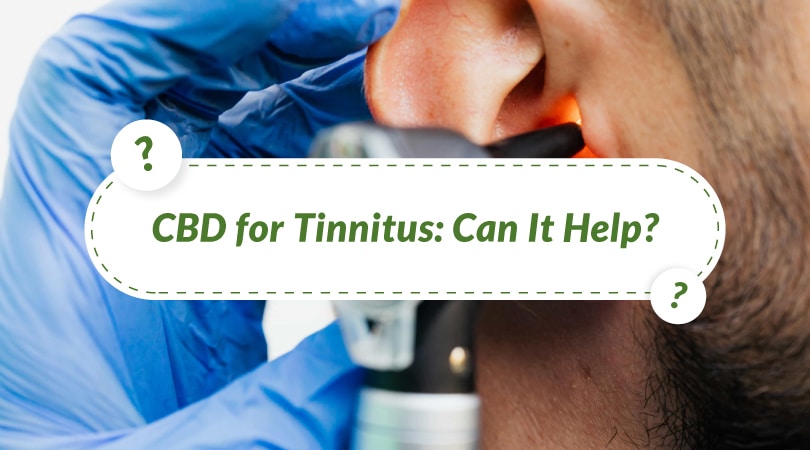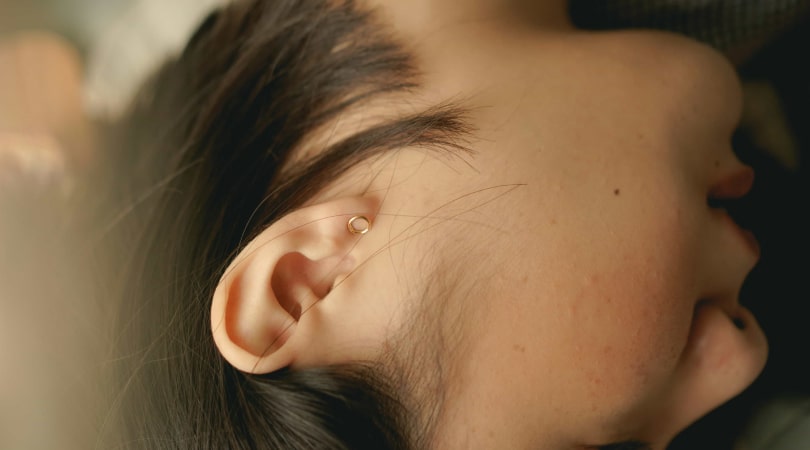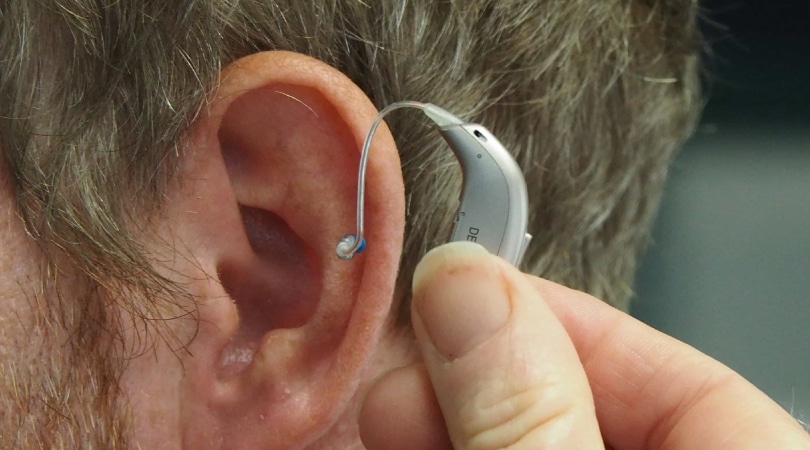
CBD for Tinnitus: Can It Help?
Tinnitus, a persistent ringing or buzzing sound in the ears, affects millions of people worldwide. For some, it’s a minor bother, but for others, it can severely impact their quality of life.
Many people with tinnitus find that traditional treatments don’t always work, which is why many are turning to alternative options like CBD. But does CBD actually help with tinnitus? Let’s delve into the science, research, and potential benefits of CBD for tinnitus sufferers.

What Is Tinnitus?
Tinnitus is a condition characterized by the perception of sound when no external sound is present. It is commonly described as ringing, buzzing, or hissing in the ears. The severity of tinnitus can vary, from a soft, occasional noise to a persistent, loud ringing that interferes with daily activities.
Tinnitus Types
There are four main types of tinnitus:
- Subjective Tinnitus: The most common form, where only the person with tinnitus can hear the sound.
- Objective Tinnitus: A rare type where the sound is audible to both the patient and others, typically caused by internal blood flow or muscle contractions.
- Somatic Tinnitus: This type is related to physical movements and touch. It can be caused by muscle tension in the jaw or neck, or by dental problems.
- Neurological Tinnitus: This type is associated with neurological disorders that affect the way the brain processes sound. It can be caused by conditions like Meniere’s disease or brain injuries.
Tinnitus Symptoms
The major symptom of tinnitus is hearing a sound that isn’t present in the external environment. Other related symptoms may include:
- Difficulty concentrating
- Sleep problems
- Anxiety or irritability
- Headaches or dizziness (in severe cases)
Causes
Tinnitus can come from various causes, including:
- Hearing loss: Often due to aging or exposure to loud noises.
- Ear infections or blockages: Earwax buildup or fluid in the ear can contribute to tinnitus.
- Medications: Certain drugs, like antibiotics or diuretics, can cause tinnitus as a side effect.
- Underlying health conditions: Conditions like Meniere’s disease, temporomandibular joint (TMJ) disorders, and cardiovascular diseases may trigger tinnitus.
When to See a Doctor for Tinnitus
While occasional tinnitus is common, persistent or worsening symptoms need medical attention. You should talk to your doctor if:
- Tinnitus occurs suddenly or without an obvious cause.
- It’s affecting your quality of life, sleep, or daily activities.
- You experience dizziness, hearing loss, or ear pain alongside tinnitus.
Common Tinnitus Treatments
Conventional treatments for tinnitus focus on managing symptoms, as there is no cure. Options include:
- Hearing aids: For those with hearing loss, hearing aids can help reduce the perception of tinnitus.
- Sound therapy: White noise machines or masking devices can drown out the ringing.
- Cognitive Behavioral Therapy (CBT): Helps people cope with the emotional distress caused by tinnitus.
- Medications: Antidepressants or anti-anxiety drugs are sometimes prescribed to alleviate severe tinnitus-related anxiety or depression.

Does CBD Help with Tinnitus?
Research on whether CBD helps alleviate tinnitus has shown mixed results. While animal studies hint that cannabinoid receptors might be involved in hearing, we still need more research to know for sure if cannabinoids, like CBD, can truly help people with tinnitus.
A 2020 study titled Cannabinoids, Inner Ear, Hearing, and Tinnitus: A Neuroimmunological Perspective suggests that cannabinoids interact with the auditory system and may help protect against auditory damage. The study also discovered that cannabinoids influence parts of the brain that aren’t directly involved in hearing, but which may still contribute to tinnitus.
While CBD has potential benefits for the brain and inflammation and has been tested for anxiety, we need more research, especially on humans, to determine whether CBD can reduce tinnitus perception or associated risk factors. This is especially true given the complex interaction between the endocannabinoid (EC) system and the neuroinflammatory responses in the auditory system.
In a 2023 survey conducted at a neuro-otology clinic (a clinic specialized in diagnosing and treating disorders of the ear, balance system, and related parts of the nervous system), 45 tinnitus patients of an average age of 54 were surveyed on their perception of cannabis for tinnitus treatment.
Of the patients, 96% expressed a willingness to try cannabis as a treatment, with 91% considering it for auditory symptoms and 80% of active cannabis users reporting improvements in symptoms such as dizziness, anxiety, pain, and sleep problems.
Pain Reduction
A 2019 study tested if CBD could help with muscle pain, which is sometimes linked to tinnitus. In this study, people applied CBD to their jaw muscles for two weeks. They found that CBD helped reduce muscle activity and pain compared to a placebo.
Inflammation Relief
A 2023 review focused on the therapeutic potential of cannabinoids, like THC and CBD. It highlighted the role of the endocannabinoid system in neurological and psychiatric diseases and the growing interest in targeting this system for treatments.
While cannabinoids like THC are currently used to treat conditions like epilepsy and multiple sclerosis, CBD’s anti-inflammatory properties show promise for treating Alzheimer’s, Parkinson’s, and other neurodegenerative diseases.
CBD Oil for Tinnitus FAQs
Full-Spectrum vs. Isolate CBD for Tinnitus
When using CBD oil for tinnitus, full-spectrum CBD is often recommended over isolates due to the “entourage effect,” where the combined components of the cannabis plant work together to enhance the therapeutic effects.
How to Choose the Best CBD Products for Tinnitus
Look for Third-Party Lab Testing:
- Independent Verification: Ensure the lab is independent and not affiliated with the company.
- Comprehensive Testing: The lab should test for potency, purity, and contaminants like heavy metals, pesticides, and residual solvents.
- Clear and Accessible Results: The company should make the lab reports easily accessible on its website.
Research the Brand’s Reputation:
- Customer Reviews and Testimonials: Look for positive feedback from other users.
- Industry Recognition: Certifications can indicate a brand’s commitment to quality.
- Transparency and Openness: Reputable brands are transparent about their sourcing, manufacturing, and testing processes.
- Clear and Accurate Information: The label should clearly state the CBD content, type of CBD (full-spectrum, broad-spectrum, or isolate), and other ingredients.
- Avoid Misleading Claims: Be wary of exaggerated health claims or promises of miraculous cures.
How to Take CBD for Tinnitus
To incorporate CBD into your routine, consider starting with a low dosage of around 5-10mg of CBD per day. Gradually increase the dosage in increments of 5-10mg every few days, monitoring your body’s response.
CBD oils can be administered sublingually (under the tongue) for quicker absorption. It’s essential to talk to your doctor before starting any new supplement, especially if you’re taking other medications.
Remember, CBD may not completely eliminate tinnitus, but it can potentially improve your overall quality of life by managing associated symptoms like anxiety and sleep issues.
Conclusion
While there is no clear scientific evidence that CBD can directly cure or alleviate tinnitus, it may offer relief for related symptoms like anxiety, sleep problems, and pain.
Further research is needed to fully understand the role of CBD and other cannabinoids in hearing processing and tinnitus management.
Ready to explore the potential benefits of CBD for yourself? Check out Vitality’s high-quality CBD products, and don’t miss out on its potential therapeutic benefits.
References
Brian E. Leonard, Feyza Aricioglu. Cannabinoids and neuroinflammation: Therapeutic implications. Journal of Affective Disorders Reports. Volume 12, April 2023, 100463. https://www.sciencedirect.com/science/article/pii/S2666915323000021#sec0005
Mavedatnia D, Levin M, Lee JW, Hamour AF, Dizon K, Le T. Cannabis use amongst tinnitus patients: consumption patterns and attitudes. J Otolaryngol Head Neck Surg. 2023 Feb 24;52(1):19. doi: 10.1186/s40463-022-00603-8. PMID: 36823672; PMCID: PMC9951523.
Narwani V, Bourdillon A, Nalamada K, Manes RP, Hildrew DM. Does cannabis alleviate tinnitus? A review of the current literature. Laryngoscope Investig Otolaryngol. 2020 Oct 30;5(6):1147-1155. doi: 10.1002/lio2.479. PMID: 33364406; PMCID: PMC7752070.
Nitecka-Buchta A, Nowak-Wachol A, Wachol K, Walczyńska-Dragon K, Olczyk P, Batoryna O, Kempa W, Baron S. Myorelaxant Effect of Transdermal Cannabidiol Application in Patients with TMD: A Randomized, Double-Blind Trial. J Clin Med. 2019 Nov 6;8(11):1886. doi: 10.3390/jcm8111886. PMID: 31698733; PMCID: PMC6912397.
Perin P, Mabou Tagne A, Enrico P, Marino F, Cosentino M, Pizzala R, Boselli C. Cannabinoids, Inner Ear, Hearing, and Tinnitus: A Neuroimmunological Perspective. Front Neurol. 2020 Nov 23;11:505995. doi: 10.3389/fneur.2020.505995. PMID: 33329293; PMCID: PMC7719758.
Shannon S, Lewis N, Lee H, Hughes S. Cannabidiol in Anxiety and Sleep: A Large Case Series. Perm J. 2019;23:18-041. doi: 10.7812/TPP/18-041. PMID: 30624194; PMCID: PMC6326553.
